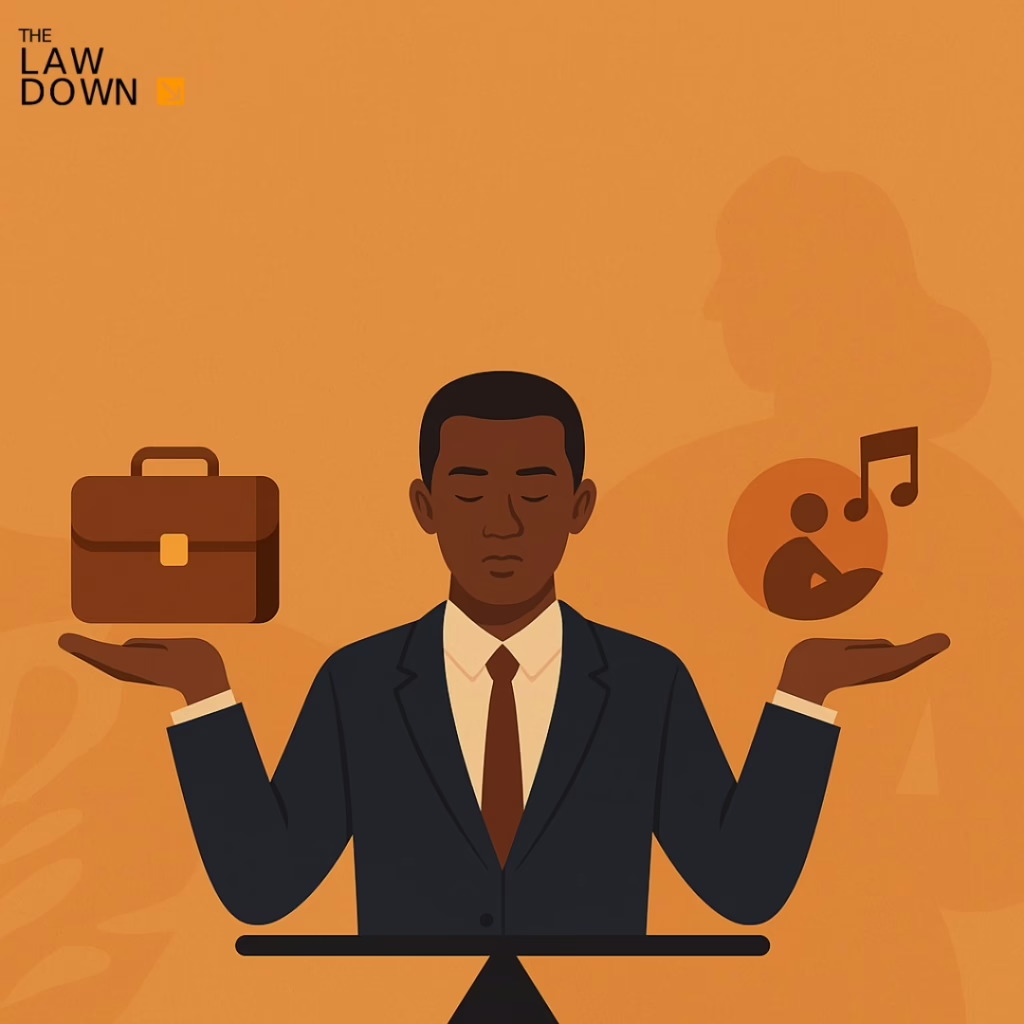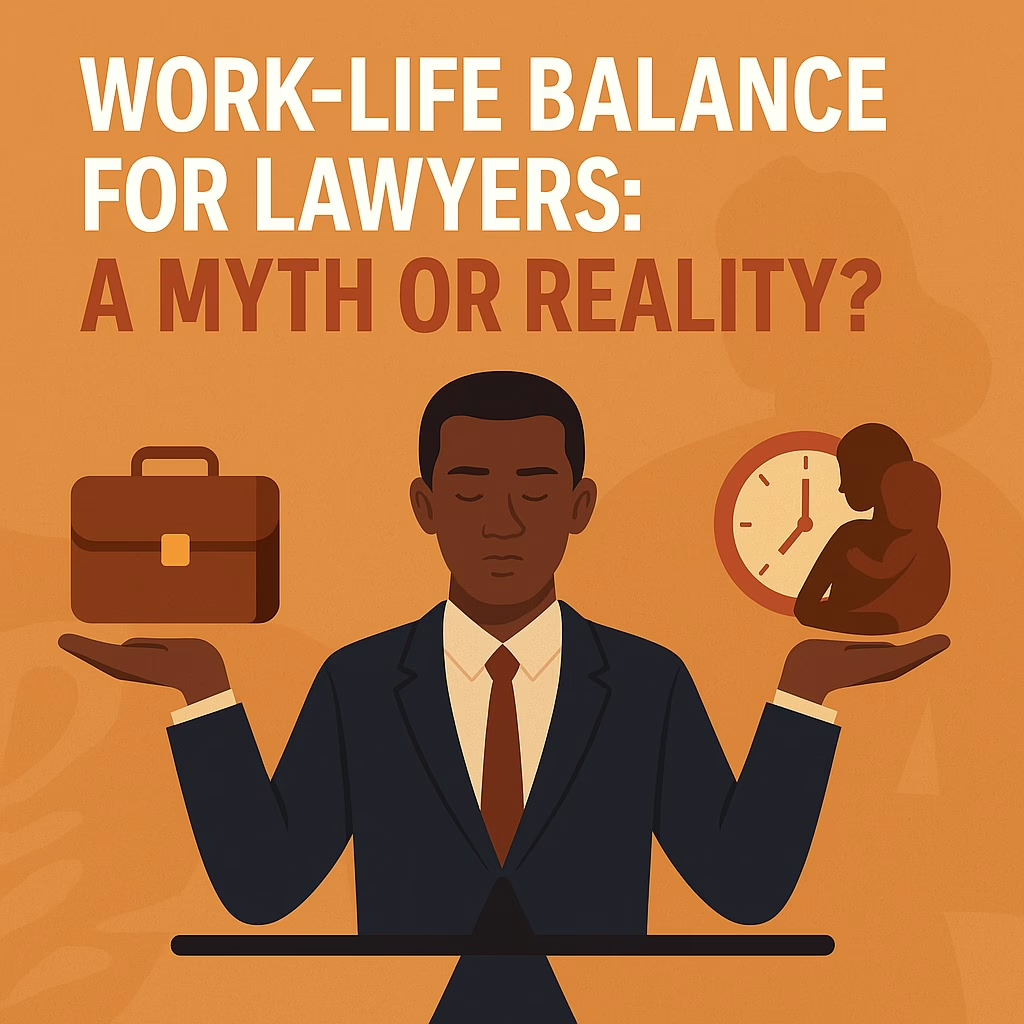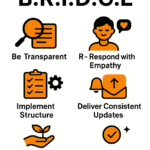Working in a stress-free environment is the dream for every employee, potential employee, and entrepreneur. However, statistics show that stress is an occupational hazard for most professions. For starters, a global report on stress by Gallup, published on Forbes, indicates that 41% of global employees are stressed.
Now let’s bring it closer home to the legal profession: A late 2021 survey by the American Bar Association established that lawyers reported experiencing burnout and a decline in well-being 52% of the time. Moreover, the report further expounded that 79% of those who experienced a decline in well-being highlighted the inability to disengage from work as a significant challenge to their well-being. Late last year, we spoke to Mr. Myron Menezes, the chairperson of the Advocates Benevolent Association, the LSK’s welfare wing, and he highlighted the inherent toxicity of the legal profession. (You can read about that here).
This brings us to the issue of work-life balance. On the one hand, work-life balance as a concept sounds appealing. However, on a practical level, is it attainable, especially in a career like the law that demands more hours and has a higher unpredictability rate?
May is mental health awareness month. As highlighted above, work plays a significant role in mental health and overall wellness. So, we spoke to Nelson Okeyo, an Advocate of the High Court of Kenya and a doctoral researcher at Friedrich-Alexander University of Erlangen-Nuremberg, a Research University in Germany. We sought to establish his understanding of work-life balance, its practicality, and the steps he takes to preserve his mental health.
How Practical is Work-Life Balance for Lawyers?
 “I don’t believe in work-life balance because this gives me the impression that just like Lady Justice with her blindfold holding the scales of justice, there’s work on one hand, and then there’s life on the other hand.”
“I don’t believe in work-life balance because this gives me the impression that just like Lady Justice with her blindfold holding the scales of justice, there’s work on one hand, and then there’s life on the other hand.”
Essentially, there is no clean split when juggling the work bit of your life and the off-the-clock bit. Perhaps ‘off-the-clock’ is a foreign concept to some. “I choose to view work as part of my life. So, it’s more about integrating the work into your life without necessarily balancing.”
According to Nelson, integrating work into your life isn’t that seamless either. “I have had points where I feel that I’m a bit strained because of my personal reading, PHD research, and participating in doctoral research and other conferences, consultancy, and an avalanche of other personal responsibilities”. Fortunately for him, he has a strategy that guides him to ensure that no element in his work-life integration overruns the others and takes a toll on him. Below is an outline of the tactics he employs as a lawyer juggling a myriad of activities to remain sane and preserve his mental health.
3 Tools Lawyers Can Employ to Achieve Work-life Integration for Enhanced Mental Health and Wellness
-
Time Out
“I take my leave very seriously. It’s not even an exaggeration, I mean super seriously.” Nelson shares that he prefers to take a 30-day consolidated leave and do every other thing except research, which is the core of his work. He prefers a consolidated leave over a few days’ leave.
He’s also very intentional about doing random things during his leave. Random can range from sleeping in on a Tuesday morning to going hiking, just no books.
However, he emphasizes that rest shouldn’t be for leave time only. Nelson is also intentional about regulating his workload during the weekdays and resting on weekends. He admits that regulating your workload may be somewhat challenging given the unpredictability of the workflow in the legal space, and in his case, juggling his work with his studies and a myriad of other things. However, cultivating the discipline to rest regularly is worthwhile for your mental health.
-
Prioritize Physical Fitness
Numerous studies present empirical evidence that physical activity has a positive effect on mental health and wellness. One such study is a 2024 cross-sectional study assessing the relationship between physical activity and depression among lawyers and legal professionals. The study conducted by the University of Utah showed a significant dose–response relationship between the amount of weekly physical activity and fewer reports of depressive symptoms found in law professionals. Moreover, the researchers from the study concluded that their findings suggest efficacy in encouraging physical activity for those in the legal field.
“I’m also very passionate about body fitness. So, I’m very particular about my fitness schedule, e.g, running time.” He adds that he loves to couple his fitness activities with catching up with his favorite audio content, including podcast episodes.
However, he adds that physical fitness is just one part of physical health. Besides exercising, he also prioritizes medical check-ups whenever he feels something is amiss in his body.
-
Self-Reflection
“I once had a gentleman say that when we attended school, the teacher would punish you for being inattentive each time you looked outside the window, yet/while in fact, this could be a very big moment for reflection. You can look beyond the window and reflect on something. In the past two years, a lot has occurred to me, but the greatest one is discovering myself. ”
Nelson points out that the chance to ask yourself hard questions so as to locate yourself in the context of this thing called life and to discover your purpose is minimal, if not lacking, in the life of an ordinary young lawyer. Essentially, as a lawyer, you need to reclaim the lost art of reflection.
“I think that in the law practice and as a young and upcoming lawyer, you went to law school, where the demands are high. After law school, you’d probably aim to establish yourself at a law firm, which may mean contending with a low entry-level salary. Now your focus is moving up the ladder, and perhaps pursuing further studies while at it, because they may help you further your cause. ” The pressure to scale the corporate ladder in the shortest time possible and make a name for oneself without taking time out for self-reflection leads many into an autopilot state, which, while efficient, is detrimental to your mental health.”
As a big reflection proponent, Nelson uses it as a tool to help him navigate work-life integration. “I take reflection seriously, so much so that I rely on reflection moments to plan for everything in my life, including finances, career goals, personal projects, and pen them down.” He points out that reflection and planning keep him grounded, helping me feel like I have some sort of control over my life.
Nelson’s reflection routine also includes consistent schedules for reading the Bible and meditating on it. “It gives me a sense that there’s a higher being, a greater sense of belonging, bigger objectives, and goals. So, even when all these practice things are gone, I know that there’s a higher power to whom I’m accountable and that I can look up to. The daily reflections coupled with thinking about my life and what is coming up have helped me to navigate some of these mental health issues that might take one down this day-to-day practice.”
Nelson concludes with a dictum by Socrates, the Greek philosopher: “A life unexamined is not worth living.” He paraphrases the quote to reflect the life of the young lawyer in Kenya today: “The unexamined life of a young lawyer is not worth the practice.”
“I would propose to any young lawyer who is in the course of decidingwhat to do or what is next in their life to pause and ask themselves the hard questions, including what their purpose is.
Bottom Line
So, is work-life balance achievable for lawyers? It’s all about perspective. However, one thing you can be certain of is that there is no fixed split. Therefore, regardless of whether you believe in work-life balance or lean more toward work-life integration like Nelson, the key is to have a sustainable balance at all times because it is a shifting rhythm.
Second, structures may vary, but they are the trellis that hold your life together. Therefore, this mental health awareness month, we urge you to integrate structures that prioritize/enhance your mental health and well-being.
Resources:
https://www.forbes.com/sites/martingutmann/2024/12/04/41-of-global-employees-are-stressed-heres-why/
https://www.mdpi.com/2673-8104/4/3/17#:~:text=The%20findings%20from%20the%20crude,symptoms%20found%20in%20law%20professionals.


















